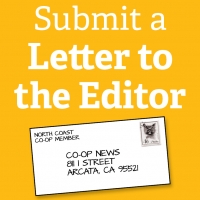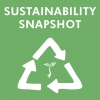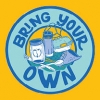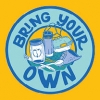
Sustainability Snapshot | Winter Quarterly 2020
Sustainability Snapshot
Community connections are vital, and a strong community network is a reliable and supportive one. The Co-op makes daily donations to local food pantries and meal delivery programs. These donations are possible because of the reliable pick up drivers from Arcata House Partnership and Food For People. We all work together to ensure food gets into the hands of those in need as quickly as possible to ensure people get fed and minimal food is wasted.
Whatever we can’t donate to our local food banks gets transferred to become the next best use, such as compost or animal feed to ensure food waste doesn’t end up in a landfill. For the year of 2019, we had a monthly average of 7,122 pounds of inedible organics (eggshells, coffee grounds etc.) and compostable materials sent to become compost. This is an incredibly effective way the Co-op takes charge of minimizing landfill waste. We will continue to explore more ways that resources can be spared and waste reduced—from all aspects of our operations. This of course extends to our members, shoppers and community.
In the summer issue of the Co-op News, I told you to expect to learn more about the concept of “eco-grief” and what we can all do to avoid feeling stunned by it. This is near and dear to my heart, but also completely in line with what cooperatives stand for—as they inherently challenge notions of traditional, exploitative capitalism. As written in the Co-op’s Mission and Values, we support “products which are environmentally sound and socially responsible, which support our local community and economy, and which meet the needs of our members.” This is the Co-op, our member-owners and community striving to be better, more resilient and tread more lightly.
I first heard of Eco-grief from HSU professor Dr. Sarah Jaquette Ray, who credits the original framework to Heidi Hutner. I encourage anyone interested in learning more about the topic to start with these experts. I have learned from these lectures and writings, but have also experienced this condition firsthand. “Eco-grief” and the similar angst of ‘climate-anxiety’ are the stressful results of worrying deeply for the future of our natural world, which can include distress over extreme weather conditions of heatwaves to hurricanes, but also deep feelings of loss for heirloom foods, native plants and species. To avoid feeling stunned by worry for the planet and our future on it, the humblest solution is action. I may not be cured, but I feel restored when I take part in building a stronger more resilient community. Dr. Sarah Jaquette Ray has described this as “collective efficacy” and “effective resilience”. So yes, participate in your community, attend a beach cleanup, plant a tree, but also advocate for local. Advocate for real sustainable organic foods. Advocate for responsible production methods. Demand proper disposal practices. Demand fair-wages. And remember to go easy on yourself—this isn’t a quick fix, but it is a worthy lifelong effort to do what we can with what we have (and what we know).
August was a big month for our sustainability efforts. In early
August, the City of Eureka launched a Zero Waste Planning Process with a kick-off event that was well attended by our community. The Co-op was honored to participate with an educational table where we shared ways to shop with less waste by showing real-life examples already used in our stores—and many of our homes!
During the last two weeks of August, we hosted our Third Annual Strawless Summer giveaway to encourage and thank our shoppers for choosing durables.
In September, we hosted another annual beach cleanup site for the now-international Coastal Clean Up Day. We rounded the year out attending multiple parts of the Zero Waste Conference at HSU, and then hosting our own Third Annual Zero Waste Day event in partnership with the City of Arcata, Zero Waste Humboldt, North Coast Environmental Center and W.R.R.A.P.’s Bicycle Learning Center. We had plenty of awesome Co-op employees and shoppers stopping by our tent to discuss and learn about what Zero Waste truly can mean for us and our community.
Finally, we started 2020 off by attending the Climate Action Plan public workshop hosted by the County of Humboldt in partnership with the City of Eureka. It was an interactive and insightful presentation of what we as a small community can do to reduce GHG (Greenhouse Gas). The City of Eureka and Humboldt County will compile our input to come to an agreed GHG emissions redu ction target. The strategies presented would not only reduce GHG but would simultaneously increase the quality of life for many Eureka residents. We will keep updating you on any progress regarding the Climate Action Plan.




